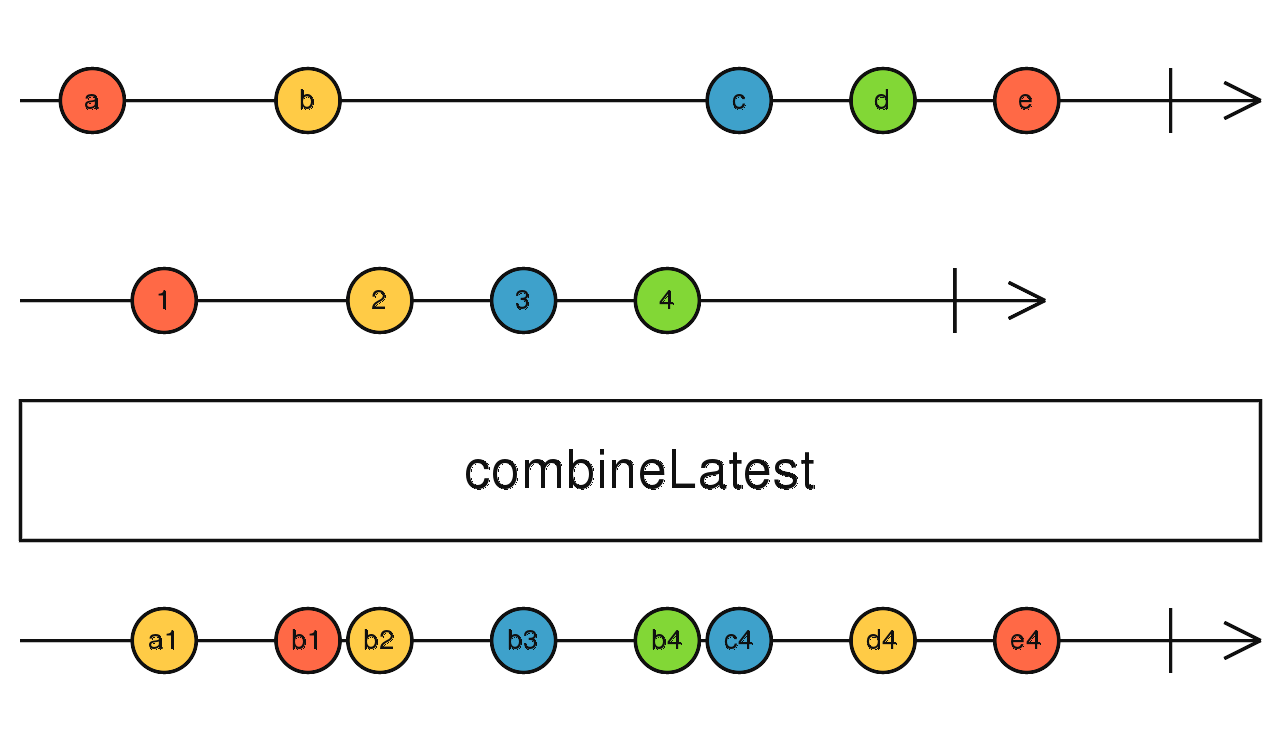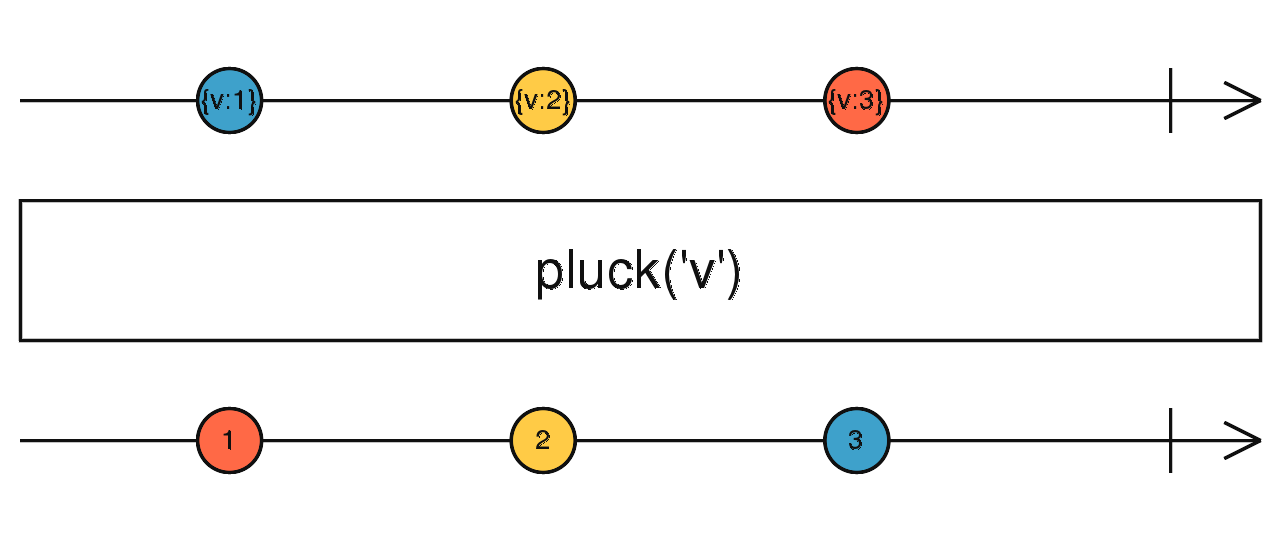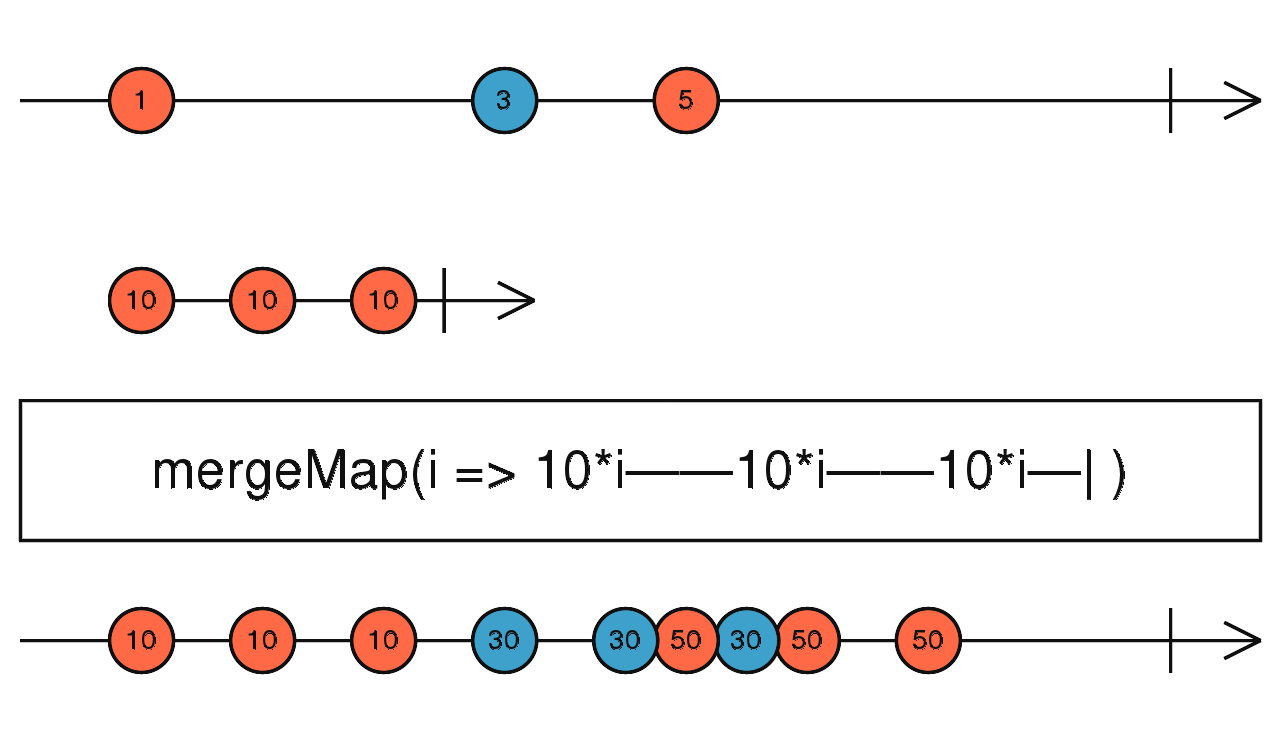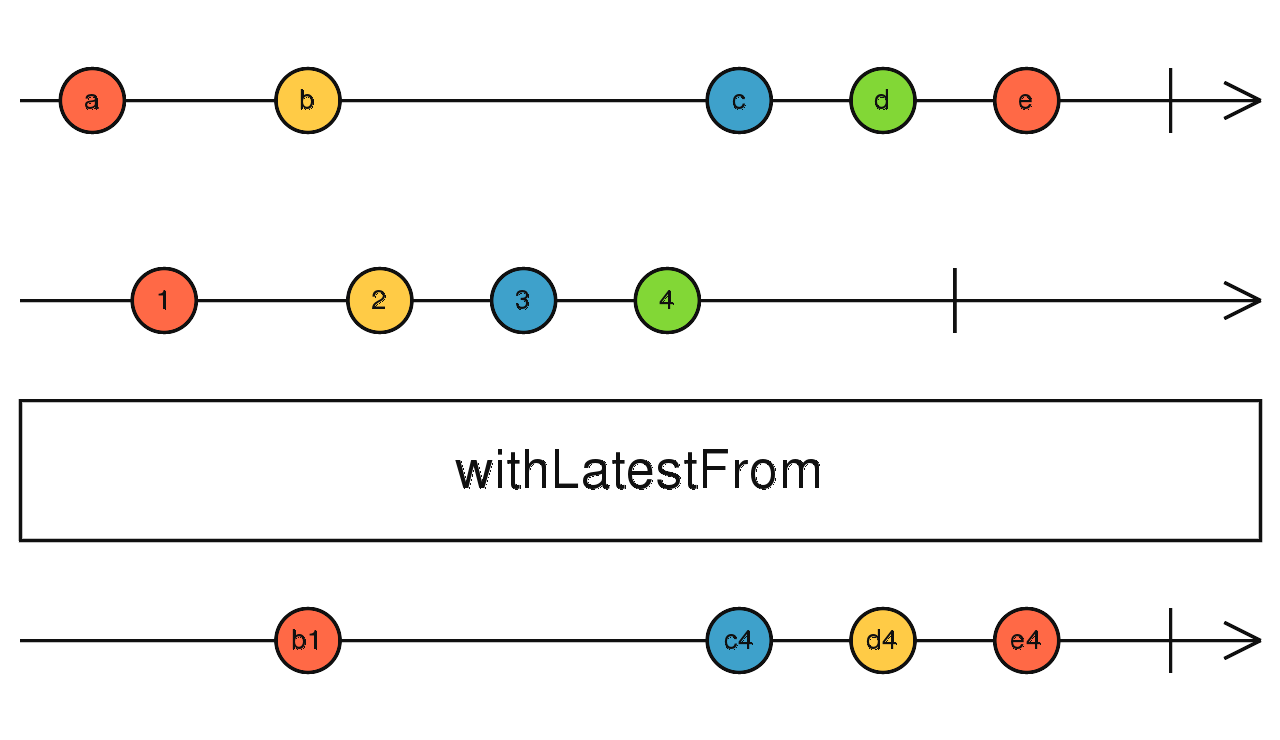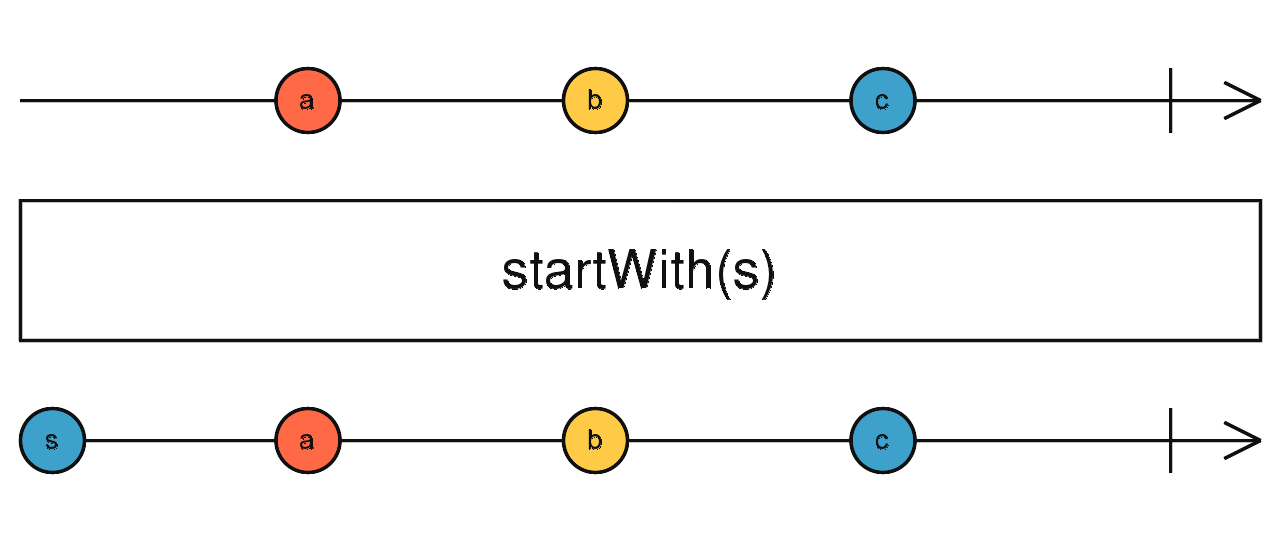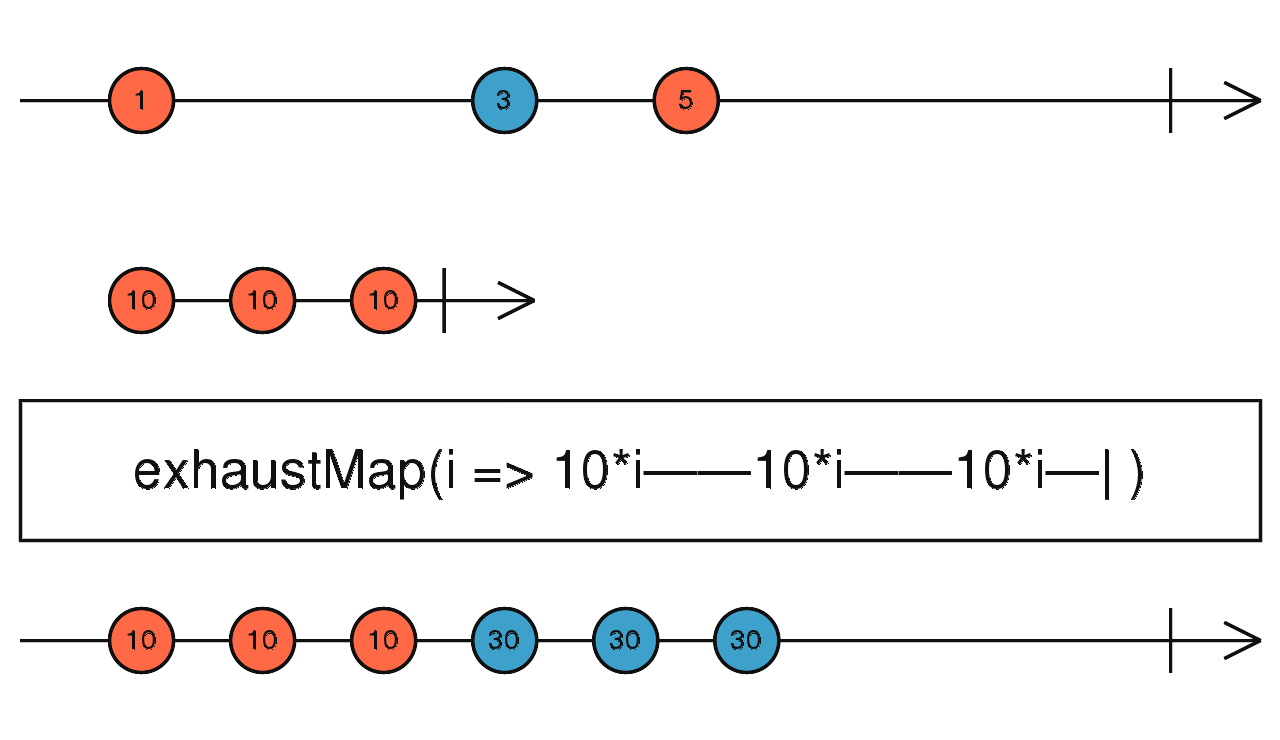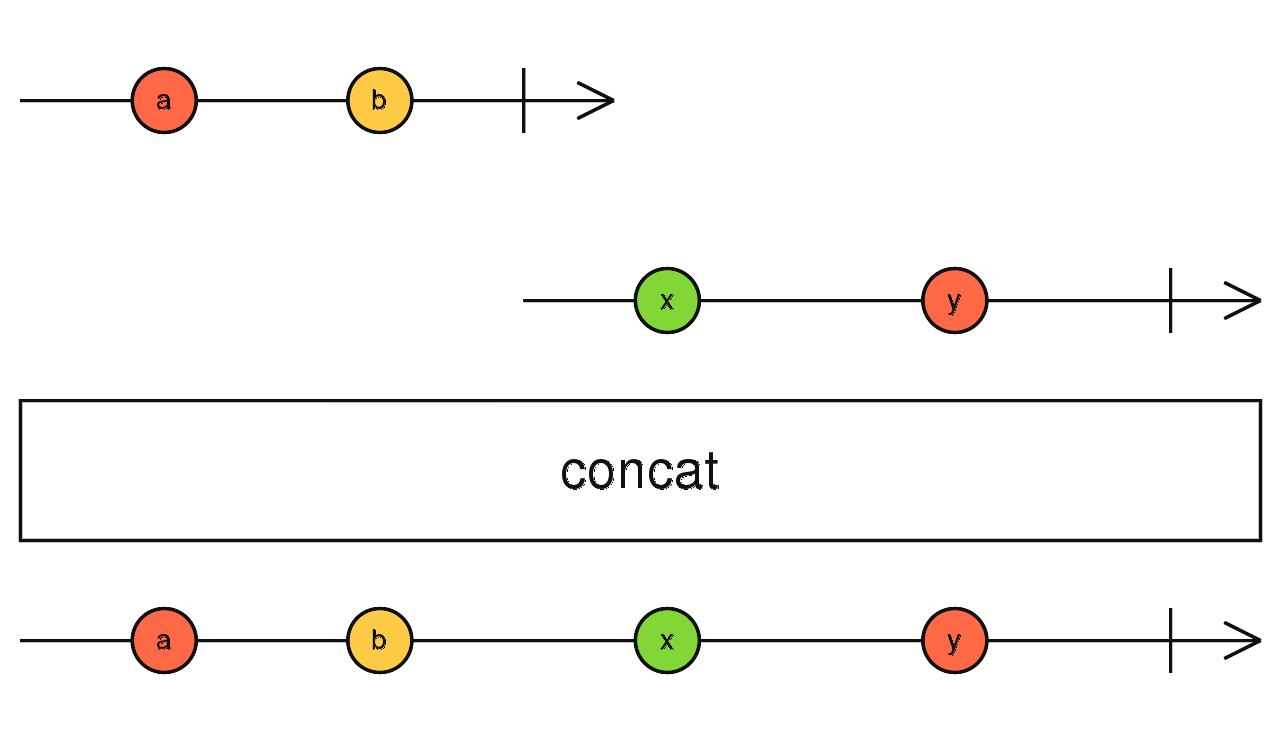Signature: combineLatest(observables: …Observable): Observable
combineLatest combines the most recent values from all the Observables passed as arguments. Whenever any Observable emits, it collects the most recent values from each Observable and emits those values as a form of array. If any input Observable errors, combineLatest will error immediately as well, and all other Observables will be unsubscribed.
Note: combineLatest will not emit an initial value until each observable emits at least one value.
If you are working with observables that only emit one value, or you only require the last value of each before completion, forkJoin is likely a better option.
- Example 1.
const firstTimer$ = timer(0, 1000); // emit 0, 1... after every second, starting from now
const secondTimer$ = timer(500, 1000); // emit 0, 1... after every second, starting 0.5s from now
const combinedTimers = combineLatest(firstTimer$, secondTimer$);
combinedTimers.subscribe(value => console.log(value));
// Logs
// [0, 0] after 0.5s
// [1, 0] after 1s
// [1, 1] after 1.5s
// [2, 1] after 2s- Example 2.
const weight$ = of(70, 72, 76, 79, 75);
const height$ = of(1.76, 1.77, 1.78);
const bmi = combineLatest(weight$, height$).pipe(
map(x => resultSelector(...x));
function resultSelector(w, h) {}Signature: pluck(properties: ...string): Observable
pluck maps each source value to the specified (nested) property. The given string values describe the path to the object(the source value) and pluck retrieves the value of the specified (nested) property from all values in the source Observable. If a property can't be resolved, it will return undefined for that value.
What makes map operator different from pluck operator is that you can perform an operation with it like,
.map(user => user.age > 18 ? 'major': 'minor')Whereas you just take a value with pluck. It simply picks one of the nested properties of each emitted value.
One convenient feature pluck offers is that you can traverse the object tree without having to be worried for falling into referencing null property.
- Example 1.
const source$ = from([
{ name: 'Joe', age: 30, job: { title: 'Developer', language: 'JavaScript' } },
{ name: 'Sarah', age: 35 }
]);
const example = source.pipe(pluck('job', 'title'));
exmaple.subscribe((val) => console.log(val));
// Logs
// Developer
// undefined- Example 2.
const clicks = Rx.Observable.fromEvent(document, 'click');
const tagNames = clicks.pluck('target', 'tagName');
tagNames.subscribe(x => console.log(x));Signature: mergeMap(project: function: Observable, concurrent: number): Observable
The difference between switchMap and mergeMap :
- When using
switchMap, each inner subscription is completed when the source emits, allowing only one active inner subscription. - In contrast,
mergeMapallows for multiple inner subscriptions to be active at the same time.
Note: If order must be maintained, concatMap could be the right choice.
You can limit the number of active inner subscriptions at a time with the concurrent parameter.
- Example 1.
const letters = of('a', 'b', 'c');
const result = letters.pipe(
mergeMap(x => interval(1000).map(i => x+i))
);
result.subscribe(x => console.log(x));
// Logs
// a0
// b0
// c0
// a1
// b1
// c1
// continues to list a,b,c with respective ascending integersSignature: skip(count: Number): Observable
skip skips/ignores the first provided number of emissions from the source. It's useful when you have an observable that emits certain values on subscription that you wish to ignore. The likely scenario is that you are subscribing to a Replay or BehaviorSubject and do not need the initial values they emit. You could mimic skip by using filter with indexes: filter((val, index) => index > 1)
- Example 1.
import { interval } from 'rxjs';
import { skip } 'rxjs/operators';
//emit every 1s
const source = interval(1000);
//skip the first 5 emitted values
const example = source.pipe(skip(5));
//output: 5...6...7...8........
const subscribe = example.subscribe(val => console.log(val));Signature: withLatestFrom(other: Observable, project: function): Observable
withLatestFrom combines each value from the source Observable with the latest values from the other(input) Observables only when the source Observable emits a value. All the input Observables must emit at least one value for the output Observable to emit a value.
The difference between combineLatest and withLatestFrom:
- The output Observable from
withLatestFromonly emits when the source Observable emits a value. - In contrast, the one from
combineLatestemits values any of input Observables emits a value.
project function can be passed to combine values. It receives the values in order of the passed Observable, where the first parameter is the value from the source Observable. (e.g. a$.withLatestFrom(b$, c$, (a1, b1, c1) => a1 + b1 + c1)). If project function is not passed, arrays will be emitted on the ouput Observable.
- Example 1.
import { withLatestFrom, map } from 'rxjs/operators';
import { interval } from 'rxjs';
//emit every 5s
const source = interval(5000);
//emit every 1s
const secondSource = interval(1000);
const example = source.pipe(
withLatestFrom(secondSource),
map(([first, second]) => {
return `First Source (5s): ${first} Second Source (1s): ${second}`;
})
);
/*
"First Source (5s): 0 Second Source (1s): 4"
"First Source (5s): 1 Second Source (1s): 9"
"First Source (5s): 2 Second Source (1s): 14"
...
*/
const subscribe = example.subscribe(val => console.log(val));Signature: zip(observables: *): Observable
zip emits values as an array after all the input observables emit. The difference between zip and other combine operators such as combineLatest, withLatestFrom is that zip waits until there is a new value from each stream as you can see from the above diagram. In other words, zip always creates pairs from events with the same indexes (ex. 1A, 2B, 3C, 4D). This will continue until at least one inner observable completes.
- Example 1.
import { delay } from 'rxjs/operators';
import { of, zip } from 'rxjs';
const sourceOne = of('Hello');
const sourceTwo = of('World!');
const sourceThree = of('Goodbye');
const sourceFour = of('World!');
//wait until all observables have emitted a value then emit all as an array
const example = zip(
sourceOne,
sourceTwo.pipe(delay(1000)),
sourceThree.pipe(delay(2000)),
sourceFour.pipe(delay(3000))
);
//output: ["Hello", "World!", "Goodbye", "World!"]
const subscribe = example.subscribe(val => console.log(val));- Example 2.
import { take } from 'rxjs/operators';
import { interval, zip } from 'rxjs';
//emit every 1s
const source = interval(1000);
//when one observable completes no more values will be emitted
const example = zip(source, source.pipe(take(2)));
//output: [0,0]...[1,1]
const subscribe = example.subscribe(val => console.log(val));Signature: timer(initialDelay: number | Date, period: number): Observable
timer creates an Observable that starts emitting after an initialDelay and emits an infinite sequence of ascending integers after each period of time thereafter. If period is not specified, the output Observable emits only one value, 0. Otherwise , it emits an infinite sequence.
- Example 1.
import { timer } from 'rxjs';
// emit 0 after 1 second then complete because second argument(period) is not provided.
const source = timer(1000);
// output: 0
const subscribe = source.subscribe(val => console.log(val));- Example 2.
import { timer } from 'rxjs';
// emit first value after 1 second and subsequent values every 2 seconds after
const source = timer(1000, 2000);
//output: 0,1,2,3,4,5......
const subscribe = source.subscribe(val => console.log(val));Signature: startWith(values: ...T): Observable
startWith returns an Observable that emits the items you specify as arguments before it begins to emit items emitted by the source Observable.
- Example 1.
import { startWith, scan } from 'rxjs/operators';
import { of } from 'rxjs';
const source = of('World!', 'Goodbye', 'World!');
const example = source.pipe(
startWith('Hello'),
scan((acc, curr) => `${acc} ${curr}`)
);
/*
output:
"Hello"
"Hello World!"
"Hello World! Goodbye"
"Hello World! Goodbye World!"
*/
const subscribe = example.subscribe(val => console.log(val));- Example 2.
import { startWith } from 'rxjs/operators';
import { interval } from 'rxjs';
const source = interval(1000);
const example = source.pipe(startWith(-3, -2, -1));
//output: -3, -2, -1, 0, 1, 2....
const subscribe = example.subscribe(val => console.log(val));Signature: scan(accumulator: function(acc: R, curr: T, index: number): R, seed T | R)): Observable<R>
scan works like reduce but unlike reduce, it emits the intermediate result on every emit of the source observable. curr is the value from the source observable and acc is what has been accumulated during the process. If you provide a seed, it will be used as the first acc .
- Example 1.
import { of } from 'rxjs';
import { scan } from 'rxjs/operators';
const source = of(1, 2, 3).pipe(scan((acc, curr) => acc + curr, 0));
// log accumulated values
// output: 1,3,6
const subscribe = source.subscribe(val => console.log(val));Signature: exhaustMap(project: function: Observable): Observable
The difference between concatMap and exhaustMap :
-
When using
concatMap, if the source observable emits another value while the inner observable hasn't completed with the previous value from the source observable, it will wait and once the inner observable completes, it will start to subscribe the inner observable with that value from the source observable. -
On the other hand,
exhaustMapwill completely ignore the outputs from the source observable while the inner observable is ongoing with the previous value from the source observable. Only after the inner observable with the previous value completes, it will start to subscribe to new inner observable. -
Example 1.
import { interval } from 'rxjs';
import { exhaustMap, tap, take } from 'rxjs/operators';
const firstInterval = interval(1000).pipe(take(10));
const secondInterval = interval(1000).pipe(take(2));
const exhaustSub = firstInterval
.pipe(
exhaustMap(f => {
console.log(`Emission of first interval: ${f}`);
return secondInterval;
})
)
/* When we subscribed to the first interval, it starts to emit a values (starting 0).
This value is mapped to the second interval which then begins to emit (starting 0).
While the second interval is active, values from the first interval are ignored.
We can see this when firstInterval emits number 3,6, and so on...
Output:
Emission of first interval: 0
0
1
Emission of first interval: 3
0
1
Emission of first interval: 6
0
1
*/
.subscribe(s => console.log(s));Signature: iif(condition: () => boolean, obsOnTrue: Observable, obsOnFalse: Observable): Observable
iif returns the obsOnTrue observable if the condition returns true, or it returns the obsOnFalse observable if the condition returns false.
- Example 1.
import { fromEvent, iif, of } from 'rxjs';
import { mergeMap, map, throttleTime, filter } from 'rxjs/operators';
const r$ = of(`I'm saying R!!`);
const x$ = of(`X's always win!!`);
fromEvent(document, 'mousemove')
.pipe(
throttleTime(50),
filter((move: MouseEvent) => move.clientY < 210),
map((move: MouseEvent) => move.clientY),
mergeMap(yCoord => iif(() => yCoord < 110, r$, x$))
)
.subscribe(console.log);- Example 2.
import { fromEvent, iif, of, interval, pipe } from 'rxjs';
import { mergeMap } from 'rxjs/operators';
interval(1000)
.pipe(
mergeMap(v =>
iif(
() => !!(v % 2),
of(v)
// if not supplied defaults to EMPTY
)
)
// output: 1,3,5...
)
.subscribe(console.log);Signature: concat(observables: ...*): Observable
concat will subscribe to first input Observable and emit all its values, without changing or affecting them in any way. When that Observable completes, it will subscribe to then next Observable passed and, again, emit its values. This will be repeated, until the operator runs out of Observables. When last input Observable completes, concat will complete as well.
- Example 1.
import { of, concat } from 'rxjs';
concat(
of(1, 2, 3),
// subscribed after first completes
of(4, 5, 6),
// subscribed after second completes
of(7, 8, 9)
)
// log: 1, 2, 3, 4, 5, 6, 7, 8, 9
.subscribe(console.log);- Example 2.
// RxJS v6+
import { concat, empty } from 'rxjs';
import { delay, startWith } from 'rxjs/operators';
// elems
const userMessage = document.getElementById('message');
// helper
const delayedMessage = (message, delayedTime = 1000) => {
return empty().pipe(
startWith(message),
delay(delayedTime)
);
};
concat(
delayedMessage('Get Ready!'),
delayedMessage(3),
delayedMessage(2),
delayedMessage(1),
delayedMessage('Go!'),
delayedMessage('', 2000)
).subscribe((message: any) => (userMessage.innerHTML = message));Signature:forkJoin(...args, selector : function): Observable
forkJoin will wait for all passed observables to complete and then it will emit an array with last values from corresponding observables. If any input observables completes without emitting any value, forkJoin will complete at that moment as well and it will not emit anything either, even if it already has some last values from other observables. If there is an Observable that never completes, forkJoin will never complete as well,
- Example 1.
// RxJS v6.5+
import { ajax } from 'rxjs/ajax';
import { forkJoin } from 'rxjs';
/*
when all observables complete, provide the last
emitted value from each as dictionary
*/
forkJoin(
// as of RxJS 6.5+ we can use a dictionary of sources
{
google: ajax.getJSON('https://api.github.com/users/google'),
microsoft: ajax.getJSON('https://api.github.com/users/microsoft'),
users: ajax.getJSON('https://api.github.com/users')
}
)
// { google: object, microsoft: object, users: array }
.subscribe(console.log);- Example 2.
// RxJS v6+
import { delay, take } from 'rxjs/operators';
import { forkJoin, of, interval } from 'rxjs';
/*
when all observables complete, give the last
emitted value from each as an array
*/
const example = forkJoin(
//emit 'Hello' immediately
of('Hello'),
//emit 'World' after 1 second
of('World').pipe(delay(1000)),
//emit 0 after 1 second
interval(1000).pipe(take(1)),
//emit 0...1 in 1 second interval
interval(1000).pipe(take(2))
);
//output: ["Hello", "World", 0, 1]
const subscribe = example.subscribe(val => console.log(val));